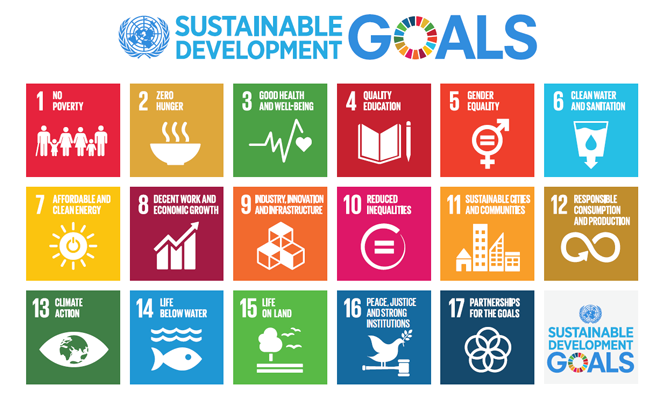Sustainable Future
永續未來
CTCI Green Engineering Sustainable Action
CTCI has long promoted Green Engineering, responding to global carbon reduction issues over the years with the implementation of multiple domestic and foreign environmental protection and energy conservation projects. These include cogeneration, waste-to-energy, waste water treatment, hydrodesulphurization, denitrification, dust removal, dioxin pollution reduction, and so on.
CTCI follows the global pace of development as it adheres to the 17 items under the 2030 Sustainable Development Goals (SDGs) defined and implemented by the United Nations. With four goals including "water and sanitation," "industry, innovation, and infrastructure construction," "responsible consumption and production," and "climate action" introduced here, we will demonstrate how CTCI contributes to green engineering through various actions.

UN’s 2030 Agenda for Sustainable Development and its 17 Sustainable Development Goals.
Water sanitation management
CTCI Recycling and Reuse of Water Resources
In line with SDG item 6, "water and sanitation," ensure that all people can enjoy water and sanitation as well as their sustainable management.
In order to effectively alleviate the pressure of water resources development and achieve the target of zero emissions, CTCI has established a public sewage treatment plant on Kaohsiung's Fengshan River. After completion of its second phase in 2019, this plant is expected to provide 45,000 cubic meters per day of recycled water. This can provide for nearly one-fifth of the daily water demand in the adjacent coastal industrial area, which will be of great benefit to improving scheduling flexibility of water resources. In addition, CTCI is constructing a Zhongli sewage treatment plant in order to improve the living environment of the public and prevent pollution of nearby rivers. The four phases of the construction project are expected to be completed in 2035, and are expected to handle up to 156,800 CMD of sewage per day depending on user demand and the pace of development.
Innovative infrastructure initiatives
CTCI Green Technology research and development applications
In line with SDG Item 9, "industry, innovation, and infrastructure construction" build resilient infrastructure, promote inclusive and sustainable industries, and accelerate innovation.
In the execution phase of Engineering, Procurement, and Construction (EPC) projects, CTCI provides Green Engineering technical lists, R&D of pre-cast methods to reduce resource consumption, use of local materials to reduce transport or give priority to the use of low-carbon transport, utilization of reusable raw materials to carry out resource recovery and control, and so on. It does so in order to aim for a recycling economic model and establishment of resilient and sustainable infrastructure development. Furthermore, CTCI not only actively strives for and expands liquefied natural gas (LNG) receiving stations for construction. It also goes further to participate in new construction plans for "cold energy factories," carrying out cold energy utilization technology research, investigation of peripheral potential demand for LNG receiving stations, and continuously improving LNG related engineering. This seeks to innovate Green Engineering technology to promote energy management efficiency.
Responsible consumption and production
CTCI recycling economy project model
In line with SDG Item 12, "responsible consumption and production", ensure sustainable consumption and production patterns.
Stages of the project execution process include standard selection, price estimation, engineering procurement and construction (EPC) implementation, and owner operation and maintenance (O & M) services. In terms of standard selection, CTCI actively strives for high efficiency and low pollution standards that enhance environmental protection. This includes natural gas, renewable energy, and so on. It also presses for refurbishment of older factories, maintenance business and so on, all consistent with the product life extension concepts of a recycling economy. When estimating price, CTCI incorporates proposed energy saving and carbon reduction proposals in its most favorable bid. During the project execution phase it carries out construction environmental management including management of air pollution, noise pollution, soil and groundwater, waste, and so on. In the owner operation and maintenance phase, the company takes initiative to participate in annual planning to extend product or asset life. And establishes a responsible consumption and production model so as to foster benefits such as improved water conservation, energy saving, and reduce carbon emissions, as well as working together to achieve waste reduction, reduced environmental impact, and promotion of a recycling economy.
Climate protection
CTCI Air pollution control and greenhouse gas detection
In line with SDG Item 13, "Climate Action," integrate resources to implement energy management, reduce greenhouse gas emissions, and mitigate climate change.
In the context of global resource depletion and climate change, CTCI's air pollution control technology has already been in place for 25 years. This includes the introduction of a waste gas cleaning system (WGCS) and air quality control system (AQCS), encompassing hydrodesulphurization, denitrification, dust removal, wastwater treatment and other work in its implementation of environmental air quality management. In the same year, at the invitation of international investors CTCI participated in CDP, the world's largest carbon disclosure organization, as well as its climate change assessment survey. This constituted a friendly response to investment market requirements to earn the trustworthiness of a green brand. In 2016, the scope of self-inspection was further expanded, carrying out on-site inventory operations each year and listing them as key annual work items. This aims to continuously deepen carbon management thinking to engineering and technical services. CTCI officially introduced ISO 14064-1 international standards for greenhouse gas inventory in 2015, and extended the scope of verification from 2012, offering four years of greenhouse gas verification in one fell swoop. As a world-class EPC services provider and as a global citizen, CTCI uses Green Engineering technology to reduce the consumption of energy and resources, as well as to reduce greenhouse gases and pollutant emissions. In doing so, CTCI aspires to achieve the 2030 SDGs proposed by the United Nations in order to address the various social and environmental difficulties faced by humankind.
